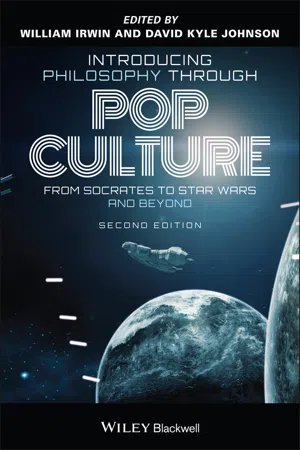
Introducing Philosophy Through Pop Culture
From Socrates to Star Wars and Beyond
- English
- ePUB (mobile friendly)
- Available on iOS & Android
Introducing Philosophy Through Pop Culture
From Socrates to Star Wars and Beyond
About this book
Can Wonder Woman help us understand feminist philosophy? How Does Wakandan technology transcend anti-Blackness? What can Star Trek teach us about the true nature of reality?
Introducing Philosophy Through Pop Culture makes important philosophical concepts and the work of major philosophers relevant, fun, and exciting. Using engaging examples from film and television, this easy-to-read book covers everything from basic metaphysics and epistemology to abstract and complex philosophical ideas about ethics and the meaning of life. You don't have to be a pop culture expert to benefit from this book—even a general awareness of cultural icons like Superman or Harry Potter will be more than enough for you to learn about a wide range of philosophical notions, thinkers, and movements.
The expanded second edition offers timely coverage of important topics such as race, gender, personal identity, social justice, and environmental ethics. New essays explore the philosophical underpinnings of The Good Place, Game of Thrones, Black Panther, Star Wars, The Avengers, South Park, The Lego Movie, The Big Bang Theory, and more. This edition is supported by a new website with links to primary philosophical texts, information about all the popular culture discussed, and additional resources for teachers, students, and general readers alike.
- Features a selection of key essays from the bestselling Blackwell Philosophy and Pop Culture Series
- Draws on examples from popular media including The Matrix, Lost, Doctor Strange, The Hobbit, Westworld, and Star Trek
- Explains philosophical concepts such as relativism, skepticism, existentialist ethics, logic, social contract theory, utilitarianism, and mind-body dualism
- Discusses the ideas of Socrates, Aristotle, Plato, Descartes, Nietzsche, Heidegger, Marx, Mill, Kierkegaard, and other important thinkers
Introducing Philosophy Through Pop Culture is an excellent supplementary textbook for introductory philos for introductory philosophy courses and a valuable resource for general readers wanting to learn about philosophy and its connections with pop culture.
Frequently asked questions
- Essential is ideal for learners and professionals who enjoy exploring a wide range of subjects. Access the Essential Library with 800,000+ trusted titles and best-sellers across business, personal growth, and the humanities. Includes unlimited reading time and Standard Read Aloud voice.
- Complete: Perfect for advanced learners and researchers needing full, unrestricted access. Unlock 1.4M+ books across hundreds of subjects, including academic and specialized titles. The Complete Plan also includes advanced features like Premium Read Aloud and Research Assistant.
Please note we cannot support devices running on iOS 13 and Android 7 or earlier. Learn more about using the app.
Information
Part I
What is Philosophy?
Introduction
1
Flatulence and Philosophy: A Lot of Hot Air, or the Corruption of Youth?
Summary
The “Danger” of South Park
Oh My God! They Killed Socrates! You Bastards!
Socrates: You say you have discovered the one who corrupts them, namely me, and you bring me here and accuse me to the jury…All the Athenians, it seems, make the young into fine good men, except me, and I alone corrupt them. Is that what you mean? Meletus: That is most definitely what I mean. Socrates: You condemn me to a great misfortune. Tell me: does this also apply to horses do you think? That all men improve them and one individual corrupts them? Or is quite the contrary true, one individual is able to improve them, or very few, namely the horse breeders, whereas the majority, if they have horses and use them, corrupt them? Is that not the case, Meletus, both with horses and all other animals? … It would be a happy state of affairs if only one person corrupted our youth, while the others improved them. You have made it sufficiently obvious, Meletus, that you have never had any concern for our youth; you show your indifference clearly; that you have given no tho...
Table of contents
- Cover
- Table of Contents
- Title Page
- Copyright Page
- Notes on Contributors
- Acknowledgments
- Sources
- Introduction
- Part I: What is Philosophy?
- Part II: Epistemology
- Part III: Metaphysics
- Part IV: Philosophy of Religion
- Part V: Ethics
- Part VI: Challenges to Traditional Ethics
- Part VII: Social and Political Philosophy
- Part VIII: Eastern Views
- Part IX: The Afterlife and Meaning
- Index
- End User License Agreement